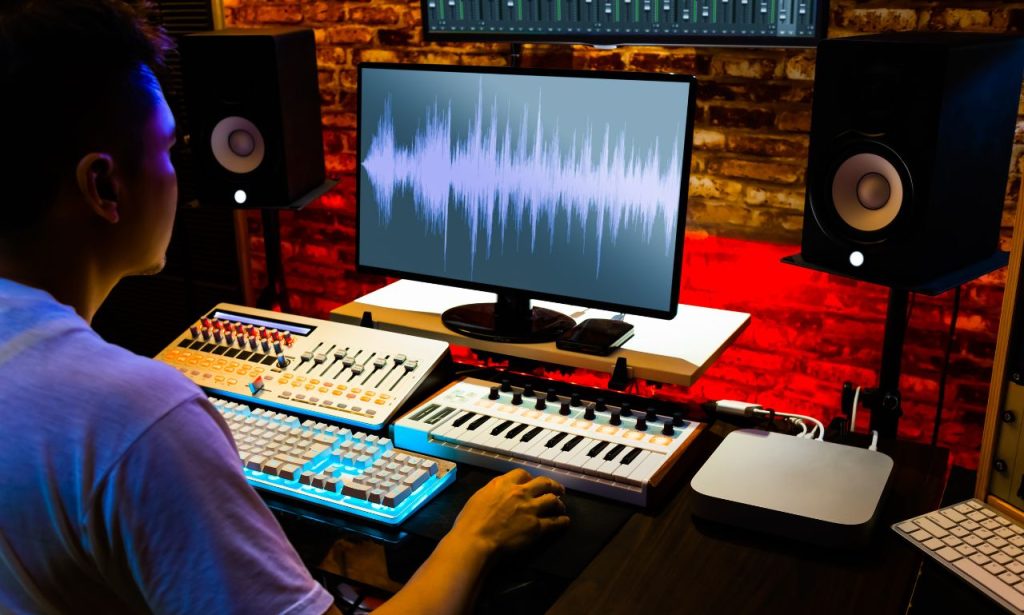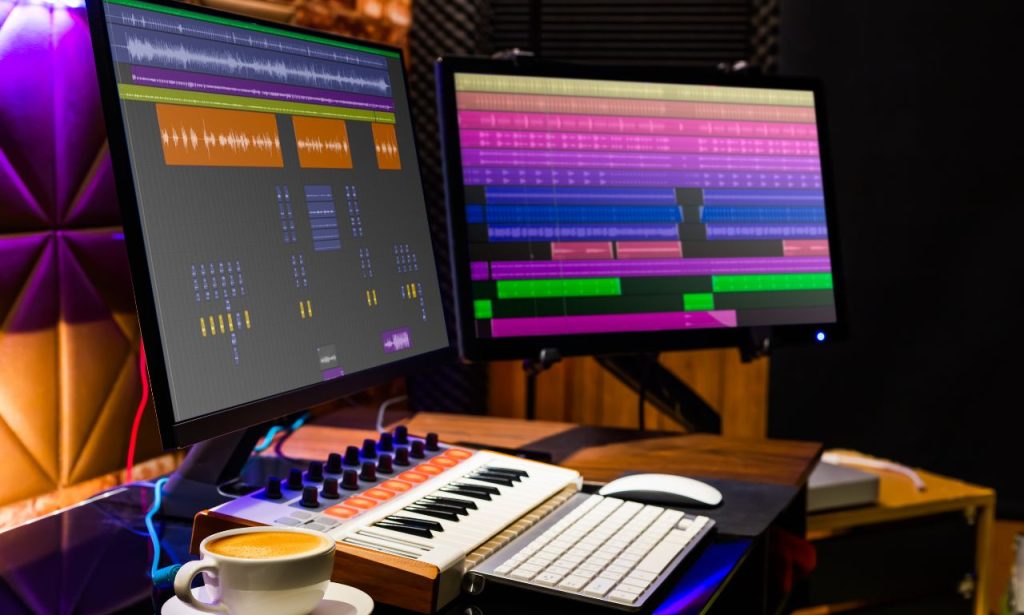Looking to take your music from amateur to pro? Choosing the right music production software is your first step toward creating studio-quality tracks. Whether you’re an aspiring bedroom producer or a seasoned artist, the right tools can transform your creative ideas into polished, professional masterpieces.
Essential Specifications for Music Production
When setting up a music production environment, the right hardware and software settings are essential for achieving smooth performance and high-quality results. Here are the key specifications to keep in mind:
Hardware Requirements
- Processor (CPU): A multi-core processor is essential for handling complex projects with multiple tracks, plugins, and real-time effects.
- Recommended: Intel Core i7 or AMD Ryzen 7 (or higher).
- RAM: Sufficient RAM is critical for managing large sample libraries and ensuring smooth workflow.
- Recommended: 16 GB (32 GB or more for heavy sessions).
- Storage: Fast storage speeds reduce load times for samples and software.
- Recommended: SSD (Solid State Drive) with at least 512 GB for primary storage; external SSD for backups.
- Audio Interface: A high-quality audio interface ensures low latency and crystal-clear audio input/output.
- Recommended: 24-bit/192 kHz interface with reliable ASIO drivers.
- Monitor: A larger display or multiple monitors improve workflow and give more space for arranging tracks.
- Recommended: 24” monitor or dual-monitor setup.
Recommended Software Settings
- Buffer Size: Lower buffer size (64–128 samples) reduces latency, ideal for recording; higher buffer size (512–1024 samples) is better for mixing to avoid CPU overload.
- Sample Rate: For high-quality audio, use a sample rate of 44.1 kHz (standard for most music) or 48 kHz (for film scoring or video production).
- Bit Depth: 24-bit recording is standard for professional-level audio quality.
- CPU Performance Mode: Enable high-performance mode in your DAW to prioritize CPU resources for music production tasks.
By optimizing your hardware and configuring these software settings, you can enhance performance and achieve professional music production results.
Common Music Production Software

Ableton Live
Ableton Live isn’t just a digital audio workstation (DAW); it’s a powerhouse for both studio production and live performances. Its intuitive interface lets you craft electronic music with ease. Whether you’re an electronic music producer or dabbling in various genres, Ableton Live provides a seamless workflow.
The Session View is a playground for spontaneity, perfect for jamming and capturing ideas on the fly. Its extensive library of virtual instruments and sound effects offers a wide range of sonic possibilities. Plus, with support for third-party plugins, your creative potential is virtually limitless.
Pro Tools
When it comes to professional audio production, Pro Tools is often the top choice. Used in studios worldwide, it excels in recording, editing, and mixing. Its advanced features cater to high-end audio production, making it ideal for post-production, film scoring, and intricate audio manipulation.
Pro Tools handles audio tracks with impeccable sound quality. The software’s powerful tools allow for precise editing and mixing, ensuring your music sounds polished and professional. If you’re aiming for studio-quality recordings, Pro Tools is an excellent choice.
Logic Pro X
Exclusively for Apple users, Logic Pro X is a comprehensive solution for music production. Its user-friendly interface is perfect for both beginners and seasoned producers. With an extensive library of stock plugins and virtual instruments, you have everything you need to create lush, professional-level tracks.
Logic Pro X shines with its advanced MIDI editing capabilities and intuitive user interface. The software also offers a wide range of sound libraries and loops to kickstart your creativity. For Mac enthusiasts, Logic Pro X is a powerful music production software that doesn’t disappoint.
FL Studio
Formerly known as Fruity Loops, FL Studio is a favorite among beginners and professionals alike. Its simple interface makes it accessible for those just starting out, yet it boasts a range of features that satisfy advanced users. The step sequencer and drum machines are particularly useful for creating beats and rhythms.
FL Studio’s virtual instruments and stock plugins provide a solid foundation for music creation. Whether you’re producing electronic music or experimenting with different genres, FL Studio’s intuitive workflow helps bring your ideas to life.
Cubase
Cubase has long been a go-to DAW for MIDI sequencing and composition. Its extensive capabilities make it suitable for complex arrangements and orchestrations. With a wide range of tools for audio editing and MIDI manipulation, Cubase caters to musicians who demand precision.
The software’s audio quality and sound libraries are top-notch. Plus, its support for third-party plugins means you can expand your sonic arsenal as needed. If you’re looking for a DAW that excels in both audio and MIDI, Cubase is a solid choice.
Studio One

Studio One by PreSonus offers an intuitive user experience that streamlines the music production process. Its drag-and-drop functionality and straightforward layout make it easy to jump in and start creating. Despite its simplicity, Studio One is packed with powerful tools for recording, mixing, and mastering.
The software supports a wide range of features, including advanced audio effects and virtual instruments. Studio One’s seamless integration with PreSonus hardware adds another layer of convenience for recording audio. It’s a versatile music production tool suitable for beginners and professionals.
Reason
Reason stands out with its unique rack-based interface, mimicking physical hardware in a virtual environment. This creative setup encourages experimentation with routing and sound design. Reason comes with built-in instruments and effects that are visually represented as rack units, making it an excellent choice for hands-on producers.
The software’s extensive library includes drum machines, synthesizers, and sample-based instruments. With its focus on creativity and sound exploration, Reason is a powerful tool for producing unique and innovative music.
GarageBand
GarageBand is Apple’s entry-level music production software, perfect for complete beginners. Its simple interface makes music creation accessible to everyone. Despite its simplicity, GarageBand offers a variety of virtual instruments, loops, and basic audio recording capabilities.
It’s an excellent starting point for those new to music production. Once you outgrow its features, transitioning to Logic Pro X is seamless, as the interface and workflows are similar.
Reaper
Reaper is a fully-featured DAW that comes at a budget-friendly price. It offers a high level of customization, allowing you to tailor the software to your workflow. Reaper handles audio and MIDI with ease, and its performance is highly efficient, even on less powerful computers.
With support for third-party plugins and an active user community providing tutorials and guides, Reaper is a flexible solution for music producers looking for powerful tools without breaking the bank.
How to Choose the Right Software
Choosing the right music production software is crucial for achieving professional results and depends on various factors such as your needs, experience level, and music genre. Here are key considerations to guide your decision:
1. Experience Level
- Beginners: If you’re new to music production, opt for software with a simple, user-friendly interface. Look for built-in tutorials and accessible workflows that won’t overwhelm you.
- Recommended: GarageBand (for Mac users), FL Studio, Studio One.
- Intermediate: If you’ve gained some experience, you may need more advanced tools like enhanced MIDI editing, mixing capabilities, and support for third-party plugins.
- Recommended: Logic Pro X, Cubase, Reason.
- Professionals: For those working on complex projects like film scoring, post-production, or live performances, advanced DAWs with precise editing tools and robust audio handling are a must.
- Recommended: Pro Tools, Ableton Live, Bitwig Studio.
2. Music Genre
- Electronic Music: If you’re producing electronic music, prioritize DAWs that offer powerful sound design tools, loop-based production, and real-time performance features.
- Recommended: Ableton Live, FL Studio, Bitwig Studio.
- Orchestral and Complex Arrangements: For composers working on intricate arrangements, MIDI control, and advanced audio handling features are crucial.
- Recommended: Cubase, Logic Pro X, Studio One.
- General Music Production: If your production style involves working across multiple genres, choose a versatile DAW that supports a wide range of virtual instruments, loops, and plugins.
- Recommended: Logic Pro X, Reason, Reaper.
3. Key Features to Consider
- MIDI Capabilities: If you’re heavy on composition and arrangement, strong MIDI sequencing and editing features are essential.
- Recommended: Cubase, Logic Pro X, Studio One.
- User Interface: A clean and intuitive interface helps streamline your workflow, especially when producing complex tracks.
- Recommended: FL Studio, Studio One, GarageBand.
- Sound Libraries and Plugins: Look for DAWs with extensive sound libraries or the ability to integrate third-party plugins for more flexibility.
- Recommended: Reason, Ableton Live, Pro Tools.
4. System Requirements

- Some DAWs require powerful computers to run efficiently. Be sure to check the minimum system requirements before choosing software, especially if you have older hardware.
- Light on Resources: Reaper, FL Studio.
- Resource-Intensive: Pro Tools, Logic Pro X.
By evaluating your skill level, genre, and the features most important to you, you’ll find the right DAW to elevate your music production to the next level.
Ready to make some noise? Pick your software and start creating your masterpiece today!
ALSO READ: How to Market Professional Services
FAQs
A: Ableton Live and FL Studio are popular choices among electronic music producers due to their intuitive interfaces and powerful tools for creating electronic sounds.
A: Yes, most of these DAWs support third-party plugins like VSTs, allowing you to expand your collection of virtual instruments and effects.
A: GarageBand is free for Apple users and is excellent for beginners. Reaper also offers an unlimited free trial with full functionality.
A: While some DAWs require more resources (like Pro Tools and Logic Pro X), others like Reaper are optimized to run efficiently on less powerful systems. Always check the system requirements before installing.




